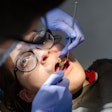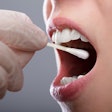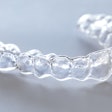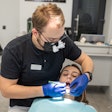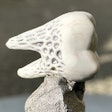
NEW YORK (Reuters) April 4 Brushing twice a day with antibacterial toothpaste and using a toothbrush with a built-in tongue scraper can eliminate chronic bad breath, according to research presented today at the 2008 annual meeting of the American Association for Dental Research in Dallas, Texas.
Chronic bad breath, or halitosis, is often caused by the breakdown of bacteria in the mouth, producing foul-smelling sulfur compounds. It's estimated that 25 percent of adults suffer the embarrassment of chronic bad breath and the percentage may be as high as 50 percent in older adults.
In a 28-day study of 14 adults with chronic bad breath, Peter Moses, a student at the State University of New York at Buffalo School of Dental Medicine, and colleagues found that brushing twice daily with a toothpaste containing triclosan and scraping the tongue surface eliminated the problem.
Triclosan is an antibacterial agent used in acne medications, hand soaps, detergents, and deodorants. "Most toothpastes do not contain triclosan," Dr. Joseph J. Zambon, who was involved in the research, told Reuters Health. Triclosan is found in Colgate Total toothpaste, made by Colgate-Palmolive Co., which sponsored the study.
At the beginning and end of the study, researchers measured mouth air levels of odor-causing bacteria and analyzed tongue scrapings for 20 species of bacteria known to cause bad breath.
According to the researchers, brushing twice daily with triclosan-containing toothpaste and using a tongue scraper reduced levels of odor-causing bacteria in the mouth from an average slightly more than 400 parts-per-billion at the start of the study to an average of 100 parts-per-billion at the end of the 28-day study period.
"All participants eliminated their halitosis after using this triclosan-containing toothpaste and a tongue cleaner," Moses said in a university statement.
"The fear of halitosis, known as halitophobia, sometimes is so great that up to 25 percent of people claiming to have halitosis actually don't," he added. "Halitophobia is associated with obsessive compulsive disorders and even has resulted in suicide, so there is a need for effective treatments for this condition."
Copyright © 2008 Reuters Limited. All rights reserved. Republication or redistribution of Reuters content, including by framing or similar means, is expressly prohibited without the prior written consent of Reuters. Reuters shall not be liable for any errors or delays in the content, or for any actions taken in reliance thereon. Reuters and the Reuters sphere logo are registered trademarks and trademarks of the Reuters group of companies around the world.










